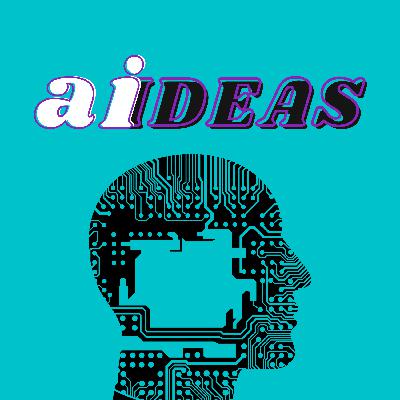Discover aideas
aideas

 aideas
aideas
Author: Graham Culbertson
Subscribed: 2Played: 20Subscribe
Share
© Copyright 2023 Graham Culbertson
Description
Halfway between poetry and mathematics, AIdeas brings you the concepts from philosophy and science fiction which make sense of AI - and the concepts from AI which will help you understand the philosophy of thinking.
Please believe in other minds.
Please believe in other minds.
16 Episodes
Reverse
Since at least Mary Shelley, women have been brilliantly writing about minds and consciousness. But very few of them have been "philosophers of mind." I'm not really sure why, but I know it's philosophy's faultThe intro and outro music is from Domenico Gabrielli's ricercar, performed on solo cello by Debbie Davis
This episode's guest is Eileen Hunt, a professor of political theory at the University of Notre Dame and the author of Artificial Life after Frankenstein. Eileen and I discuss a number of topics related to AI and Frankenstein, including:Mary Shelley's upbringing as the daughter of two radical thinkersThe political and literary influences on the novelThe role of parenting in the novelThe similarities between The intro and outro music is from Domenico Gabrielli's ricercar, performed on solo cello by Debbie Davis
Philosophy used to be the search for wisdom, but it's become a search for certainty. And if you send an AI on a search for certainty, you'll probably create a sociopathThe intro and outro music is from Domenico Gabrielli's ricercar, performed on solo cello by Debbie Davis
If sentience means "having senses," then your floodlights that turn on when someone walks by are sentient. But if floodlights are sentient, maybe sentience isn't quite the right word.The intro and outro music is from Domenico Gabrielli's ricercar, performed on solo cello by Debbie Davis
What kind of a weirdo collects dumb things like barbed wire?
Slave actually means Slav. And the word robot is a Slavic word. It means slave.Here's the article about American slavery that I mentioned by Nell Irvin Painter: How We Think About the Term "Enlsaved" Matters
My guest today is James Yu, cofounder of Sudowrite, an AI companion for fiction writers. James and I discuss how neural networks process language, how AI can help writers, and the difficult path forward for using AI to help humans write without competing with them. Plus we imagine what it would be like if your favorite author turned out to be a robot!The intro and outro music is from Domenico Gabrielli's ricercar, performed on solo cello by Debbie Davis
What caused you to to believe in causes?
On this first interview episode of AIdeas I'm joined by Joshua Glenn, editor of Radium Age, a fantastic new series from MIT Press. We discuss the Radium Age, Joshua's name for the era of science fiction right before the better known Golden Age of the 1930s through the 1950s, and especially "The Machine Stops," E.M. Forster's 1909 story about a world in which automation provides humanity with everything it needs. The opening volume, containing Forster's story and Joshua's introduction, is Voices from the Radium AgeJosh also wrote a wonderful roundup of other stories of AI from that era, Radium Age AIThe intro and outro music is from Domenico Gabrielli's ricercar, performed on solo cello by Debbie Davis
Turns out it's man
Shall we play a game?
Mammas, don't let your robots grow up to be effective altruists
"Bright day. Breakfast. Return of common sense and cheerfulness."-Friedrich Nietzsche
This episode covers one of the most famous thought experiments about AI: John Searle's Chinese Room. And how it is wrong, wrong, wrong, wrong.
What do chatbots know? Words, words, words.Here's Janelle Shane's response to the sentient chatbot pseudo-controversy: https://www.aiweirdness.com/interview-with-a-squirrel/
Right now, there are people out there creating minds. And there are people who study minds – most of whom have argued that human thought is a unique, almost sacred thing that can never be replicated. These groups almost never overlap. This podcast seeks to bridge that gap.





